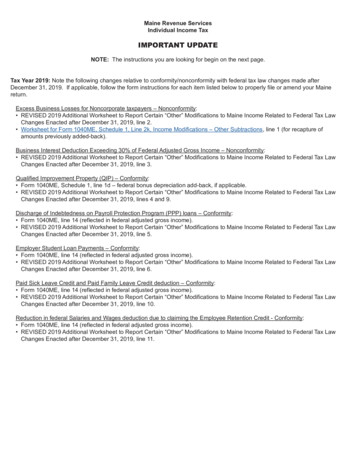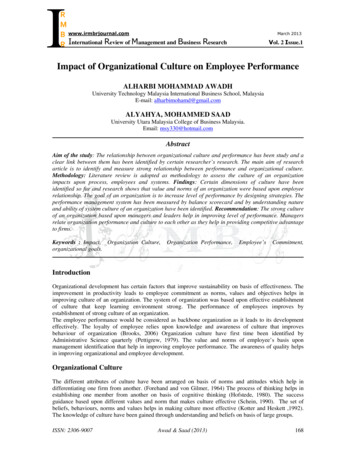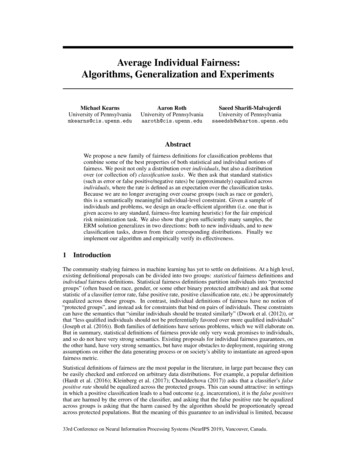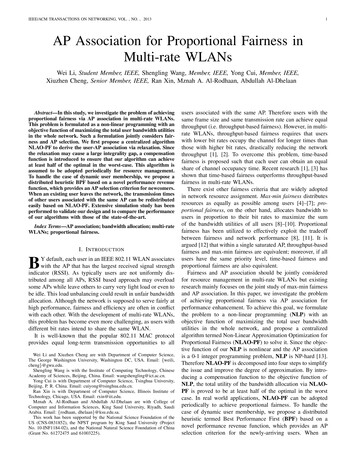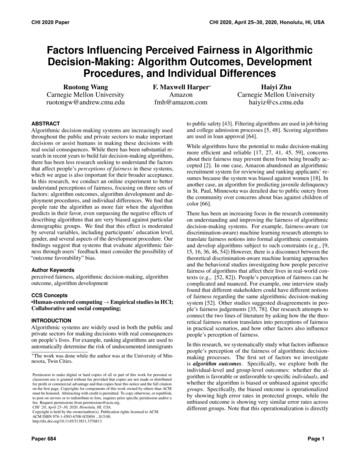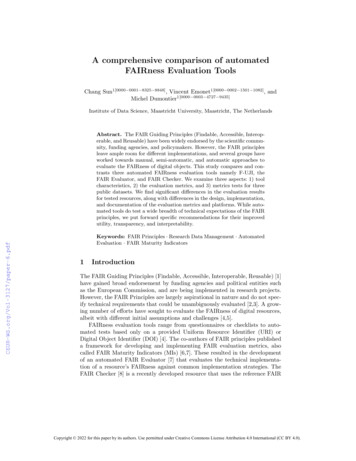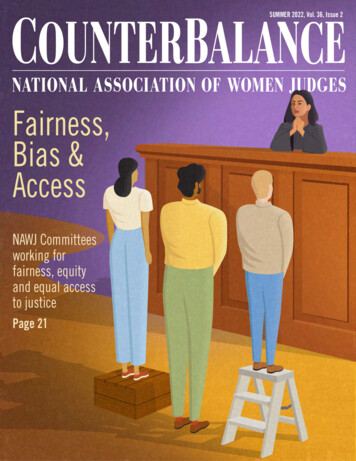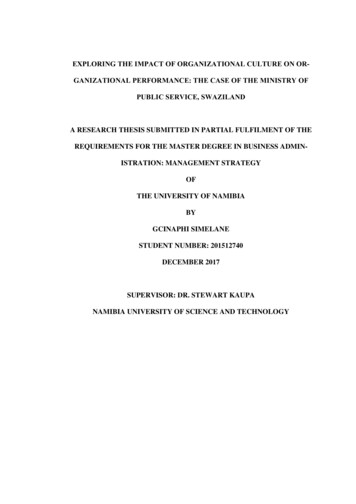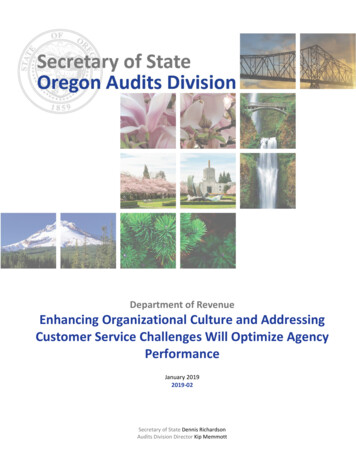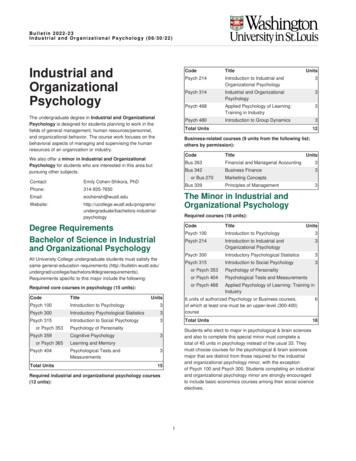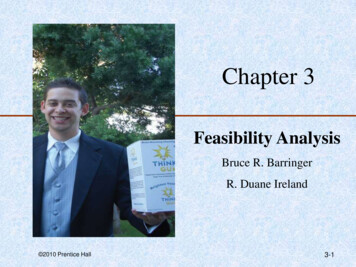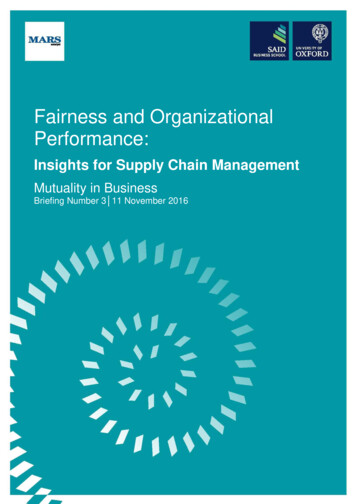
Transcription
Fairness and OrganizationalPerformance:Insights for Supply Chain ManagementMutuality in BusinessBriefing Number 3 11 November 2016
Mutuality in BusinessBriefing Number 3 11 November 2016Dr Ruth YeomanDr Milena Mueller SantosSaïd Business SchoolEgrove ParkOxford OX1 5NYwww.sbs.oxford.edu/mutualityAuthors’ note: The conclusions and recommendations of any Saïd Business School,University of Oxford, publication are solely those of its author(s), and do not reflectthe views of the Institution, its management, or its other scholars.Mutuality in Business Briefing Number 2
ContentsContents . i1. About the Authors. ii2. INTRODUCTION . 13. THEORETICAL BACKGROUND . 23.1Key Insights from Economics and Psychology . 54. FAIRNESS AND ORGANIZATIONAL PERFORMANCE . 84.1Fairness and Employees. 84.2Fairness in the Supply Chain . 104.3Supply Chain Fairness at the BOP. 125. CONCLUSION . 186. WORKS CITED . 19Mutuality in Business Briefing Number 3i
1. About the AuthorsRuth YeomanResearch FellowDr Ruth Yeoman is a Research Fellow at Kellogg College University ofOxford where she manages the Centre for Mutual & Employee-ownedBusiness. Her academic work centres on the ethics and practices ofmutuality and meaningfulness. In 2016, she was awarded a grant bythe British Academy/Leverhulme to examine ‘Ownership, Leadershipand Meaningful Work’ in employee-owned businesses, and to supporther leadership of an international collaboration studying organizationalmeaningfulness. Recent projects include: ‘Reframing Building Societiesand Mutual Insurers: collaboration as a source of competitiveadvantage’ for the BSA and AFM; ‘Mutuality and Integrated Healthcare’funded by Oxford’s John Fell Fund; ‘Mutuality in Business’, funded byMars Inc. Her book, Meaningful Work and Workplace Democracy: aphilosophy of work and a politics of meaningfulness, is published byPalgrave Macmillan.Milena Mueller SantosResearch AssociateDr Milena Mueller Santos holds a DPhil in Organizational Studies fromOxford University. For her thesis she explored the phenomenon of CSRinnovation, comparing CSR programmes of British and Indian retailers.For her DPhil project Milena conducted several months of fieldworkboth in the UK and India. Prior to this, Milena completed an MPhil inInnovation, Strategy and Organization from Cambridge University. Herresearch investigated IPOs of clean technology companies onLondon’s Alternative Investment Market (AIM). She also holds aBachelor’s degree in European Social and Political Studies fromUniversity College London. In recent years, Milena has supportedvarious projects as a research assistant. In 2011-2012 she worked withProfessor Tim Morris on a project investigating organizationalreputation of consulting companies. In 2015 Milena joined Dr RuthYeoman's team to assist with a literature review on supply chainfairness.Mutuality in Business Briefing Number 3ii
Fairness and Organizational Performance:Insights for Supply Chain ManagementFairness is an ethical principle that speaks to how we treat one another in our social and economicinteractions. Managers that seek to improve the fairness of relationships between the firm andemployees, as well as within the supply chain, may see positive effects on organizationalperformance. Here is what you need to know: Fairness is complex and it can be approached from both normative (how we should act)and behavioural (how we do act) perspectives. To break down the concept, it can be useful to look at fair outcomes, fair processes, andfair interactions. When employees perceive that they are fairly treated, this can improve their willingness towork hard and collaborate – both key for success. Fairness in the supply chain can involve navigating large power differences as well asengaging with supplier practices. To improve supply chain fairness, particularly at the BOP, we need to look beyond outcomefairness and incomes, and to consider how to make processes and interactions fairer.ABSTRACT For this briefing document we review the organizational fairness literature witha focus on the supply chain context. Supply chain fairness is an under-researched topic andwe seek to close this gap through a systematic literature review. We draw upon keycontributions to the psychology, economics and organizations studies literature to illuminatethe salient features of fairness in social and economic systems, such as supply chains. Thisbriefing document highlights that fairness influences economic behaviour and firmperformance in important ways. The literature shows that fairness in organizational practicescan foster various sources competitive advantage and hence improve organizationalperformance. While there is a robust literature on fairness in the human resourcesmanagement (HRM) domain, fairness perceptions by other stakeholder groups areunderexplored and warrant further research attention. Moreover, while the business case forsupply chain fairness is well established, other salient issues remain under-researched in theacademic literature. We explore avenues for future research.Mutuality in Business Briefing Number 3iii
2. INTRODUCTIONFor this briefing document we review the organizational fairness literature with a particular focus onthe supply chain context. Broadly speaking, fairness is a moral intuition and social norm, which hasbeen derived conceptually from philosophy and political theory. Fairness principles are plural(Capellen et al, 2007; Konow, 2003) and values form the basis of fairness judgements (Etzioni,1988; Schminke et al, 2014). An important insight from this brief is that concerns for fairnessfundamentally affect economic behaviour and fairness appears to be significantly related toorganizational performance. Most studies of organizational fairness focus on the employees as thefocal stakeholder group; we find that other stakeholder contexts, including supply chainrelationships, remain under-researched.We draw upon key contributions to the psychology, economics and organizations studies literatureto illuminate the salient features of fairness in supply chains. Organizational fairness has emergedas an important topic in the literature as it has been found that behaviour is not only determined byself-interest; many people are strongly motivated by other-regarding preferences, includingconcerns for fairness (Kahneman et al, 1986). This has important implications for what isconsidered a fair profit level, fair wage or fair price in the supply chain context and how such fairallocations can be achieved procedurally. We explore these issues through a systematic review ofthe literature addressing fairness in the supply chain.Mutuality in Business Briefing Number 31
3. THEORETICAL BACKGROUNDFairness is concerned with how we treat one another in our social and economic interactions. Byinvoking fairness, we are making some statement, forming some judgement, about how peopleought to be treated, how they are actually treated, and what this implies for justice. The formalprinciple of distributive justice can be found in Aristotle’s statement of equality that equals shouldbe treated equally and unequals unequally. More precisely:Individuals who are similar in all respects relevant to the kind of treatment in questionshould be given similar benefits and burdens, even when they are dissimilar in otherirrelevant respects; and individuals who are dissimilar in a relevant respect ought to betreated dissimilarly, in proportion to their dissimilarity (Velasquez 1998).Since Aristotle, thinking on fairness has continued to develop. Theoretical treatments of fairnessfrom moral and political philosophy now yield a plurality of fairness principles, although manyengage core concepts such as equality, equity, need, merit and efficiency. These theoreticalapproaches to fairness are contrasted in Table I, at the end of the section.‘ people value equity but prefer to live in societies that sacrificesome equity in order to provide for higher minimum and meanearnings ’Empirical studies of fairness principles in human action indicate that individuals often favourcollections of fairness principles, prioritising or combining them according to the context. In a studyof fairness trade-offs, Ordonez & Mellers (1993) examine responses to, firstly, what people wouldfavour in the ‘more fair’ society, and, secondly, what they would favour in the society in which theywould ‘prefer to live’. They found that ‘people value equity but prefer to live in societies thatsacrifice some equity in order to provide for higher minimum and mean earnings’ (Konow, 2003:1234). In a review of studies of fairness preferences, Konow (2003) concludes:The implication of these studies is that equity (i.e., justice in the specific sense) guides butdoes not monopolize distributive preferences: people care about equity, but the allocationsthey prefer for themselves and consider right are also influenced by concerns for efficiencyand need. (ibid: 1235)Mutuality in Business Briefing Number 32
fairness is a social practice, and a core component of anyscheme of ‘mutual assurance’.This leads Konow (2003) to propose a ‘multicriterion theory of justice’ in which ‘three justiceprinciples are interpreted, weighed and applied in a manner which depends upon the context’ (ibid:1235). The social processes whereby people collectively determine what fairness means and howfairness principles are to be identified, weighted and prioritised against other moral concerns, leadsJames (2013) to propose that fairness is a social practice, and a core component of any scheme of‘mutual assurance’. As a social practice, fairness principles become part of the formation processof fairness perceptions, which includes collective judgements on how people are treated accordingto the values relevant to the situation (Etzioni, 1988; Schminke et al, 2014). Fairness as a socialpractice includes the procedural, distributive, interactive dimensions of justice (Whitman et al,2012).The effectiveness of social practices in arriving at ‘all things considered’ fair outcomes depends onan integrated set of factors such as setting up the communicative interaction based upon mutualrespect, openness and availability of information, readiness to listen to different points of view andcommitment to the outcome. In order to be seen to be fair, communicative interactions must adoptsystematic procedures for weighing up competing claims and interests. For example, in order tomediate fairly between different kinds of publicly acknowledged and legitimate claims, Griffin(1995) proposes a principle of trade-offs: ‘first, a principle of maximization; and next, whenmaximization does not rank options, a principle of equal well-being; and finally, when equalizationdoes not rank options, a principle of equal chances at well-being’ (ibid: 104). Anand (2001) foundthat people view processes that allow for greater participation, freedom and information as morefair. Finally, Frey & Stutzer (2001) argue that fairness as justice is not our sole concern, but thatbehaviour and preferences may be motivated also by altruism, responsibility, friendship, selfinterest or other moral considerations.Perceptions of fairness indicate what our moral sensibilities find tobe pleasing and attractive.Taking a different approach, in his analysis of the etymological origins of ‘fair’, Cupit (2011) tracesthe links between fairness and social order. Perceptions of fairness indicate what our moralsensibilities find to be pleasing and attractive. In particular, fairness picks out the kinds of reasonsMutuality in Business Briefing Number 33
that should guide our interactions: ‘To be partial and biased is to be moved by the wrong sorts ofreasons’ (ibid: 398). Arrangements may be judged to be orderly, and therefore fair, whenallocations are ‘in accordance with what is due’ (ibid: 399), and subject to distributive proceduresthat are guided by the correct reasons of impartiality and efficiency, according to some publiclyrecognised feature of the recipient such as need or desert. Such publicly recognised features offairness ground our capacity to make legitimate claims (Broome, 1994). A claim is a compellingreason that ‘is owned to the candidate herself,’ and fairness aids us in mediating between differentkinds of claims.This [mutual] assurance and security is vital for mitigating the risksassociated with social cooperation, increasing trust and reducingthe anxiety that we will be exploited More specifically, claims do not operate as constraints; rather, ‘fairness requires that eachcandidate's claim should be satisfied in proportion to its strength’ (ibid: 38). Therefore thesatisfaction of claims is dependent upon a number of factors including: what is judged to be a validand legitimate claim, the claims of others and the process for judging between different kinds ofclaims. The potential for proliferation of differences in opinion, judgement and settlement is clear.What rules will guide the determination of fairness, who will be involved, and what will be the basisof their involvement is a necessary part of any ‘fairness system’.In this way, the social norm of fairness underwrites regularity, impartiality and how to treat otherpeople in non-arbitrary social arrangements, characterised by ‘mutual assurance’ (James, 2013).Mutual assurance is the certainty and security in that we can expect others to act in regular andpredictable ways. This assurance and security is vital for mitigating the risks associated with socialcooperation, increasing trust and reducing the anxiety that we will be exploited or will fail to securea fair return from joining our efforts to those of others.Mutuality in Business Briefing Number 34
Table I: Summary of relevant theoretical approaches to fairnessGeneral TheoriesGielissen &Graafland (2009)Konow (2003)Cappelen at ry theory;psychologyEgalitarianismEqual incomesfor allNeed PrincipleEqual satisfaction of basic needs(Rawls, Marx)Positive RightsRights to aminimum incomeEfficiency PrincipleMaximising surplusStrict EgalitarianismAll inequalities shouldbe equalised even incases involvingproductionDeontologyDuties and rightsConsequentialismUtilitarianism e-making anddiscourse theory3.1Principle ofmoral desertContributionmeasured byeffort or marketpriceLibertarianismTransactions arefair when theyare voluntaryEquity (accountability) Principle– ‘proportionality and individualresponsibility’ (equity and deserttheory, Nozick)Context Family – ‘dependence ofthe justice evaluation on thecontext, such as the choice ofpersons and variables, framingeffects and issues of process’(Kahneman, Knetsch & Thaler,Walzer, Elster, Frey).LibertarianismThe fair solution is togive each person whathe or she producesLiberalEgalitarianismOnly inequalitiesarising from factorsunder individualcontrol should beacceptedKey Insights from Economics and PsychologyBehavioural economics has shown that economic behaviour is not only determined by self-interestand that many people are strongly motivated by other-regarding preferences, including fairness.This short summary looks at key insights from survey and experimental research on how and inwhich situations fairness constraints impact economic transactions. context matters, fair-minded people will not always behave“fairly” depending on the strategic environment in whichtransactions take placeCognitive psychologists and behavioural economists have advanced this area of research throughsurvey and experimental design methods. Research has tried to establish fairness rules regardingthe distribution of resources among different actors, for example, firm and consumer or firm andemployee. These have important implications for what is considered a fair profit level, fair wage orfair price and how such fair allocations can be achieved procedurally. This research suggests thatfairness concerns matter more in some markets than others. Generally, self-interest tends toMutuality in Business Briefing Number 35
dominate in competitive markets, while other-regarding preferences, including fairness, mattermore in markets with incomplete contracts, such as labour markets (Fehr and Schmidt 2001).Indeed, context matters, and it has been suggested that fair-minded people will not always behave“fairly” and that self-interested people will sometimes behave “fairly”, depending on the strategicenvironment in which transactions take place (Fehr and Schmidt 2001).Classic studies have looked at how participants perceive outcome fairness; outcome fairnessconcerns the result of an interaction and is often contrasted with procedural fairness, whichconcerns the process that lead to an outcome. In their famous survey-based study, Kahneman etal. (1986) introduced the principle of “dual entitlement,” i.e. that both parties to a transaction areentitled to a reasonable amount of gain. The concept of reference transactions tends to be adoptedas measure of fairness. A reference transaction is a precedent or yardstick against which othertransactions are measured; this could be derived from a recent transaction, for example, or aperceived ‘average’ transaction. Firms are entitled to the profit realised in reference transactions,and stakeholders are entitled to the terms of the transaction. This implies that it is considered fairfor firms to raise prices as costs rise (Kahneman et al. 1986; Rubin 2012). Furthermore, it hasbeen shown that people are willing to punish behaviour that is perceived as unfair and are willingto reward actions that are perceived as generous or fair (Fehr, Kirchsteiger and Riedl 1993). a rise in stake levels does not necessarily induce people to act ina more selfish manner This willingness to punish unfair behaviour has been illustrated in the classic ultimatum gamewhereby two players have the chance to win a sum of money, which is supposed be split betweenthem. One player makes an offer on how to split the sum; the other player can accept or reject theoffer. If the deal is rejected, both players receive nothing. It is has consistently been shown thatpeople tend to be unwilling to accept low, ‘unfair’, offers and prefer sacrificing money to lower thepay-out of the other player (Güth, Schmittberger, and Schwarze 1982). Indeed, the Gift ExchangeGame has shown that people are willing to reward fair behaviour (Fehr, Kirchsteiger and Riedl1993). In this game, a proposer offers a sum of money, which a responder can accept or reject.Both players don’t receive any money for a rejected offer. The acceptance of the offer tends to bepositively related to the amount of money offered (Fehr and Schmidt 2001). Interestingly, it hasbeen shown that a rise in stake levels does not necessarily induce people to act in a more selfishmanner (Fehr and Schmidt 2001; Fehr and Tougareva 1995). In recent years, these mechanismshave been explored further through more complicated experimental set-ups, including repeatMutuality in Business Briefing Number 36
experiments (Fehr and Schmidt 2001; Charness and Rabin 2005).While a large part of the experimental literature has focused on outcome fairness, some studieshave also addressed the question how procedures impact perceived fairness. The concept of“procedural utility,” which is defined as the benefits derived from a well-designed process ratherthan just its outcomes, can shed light on this question. Frey et al. (2004) show that individuals canderive procedural utility from institutional sources and interactions with other actors. For example,people may gain procedural utility from democratic institutions because they voted for theirrepresentatives (the process) not simply because the elected officials may be more responsive(the outcome). They may also gain procedural utility if they feel fairly treated by other actors, forexample, their employers. people view using market mechanisms to address excessdemand as procedurally unfair.Even though many previous studies did not take an explicit procedural perspective, they haveimplications for procedural utility and fairness. For example, Kahneman et al.’s (1986) classic studythat found that a majority of respondents viewed an increase of the price of snow shovels after asnowstorm unfair has procedural dimensions. Frey et al. (1993) interpreted this to mean thatpeople view using market mechanisms to address excess demand as procedurally unfair. Againstthis background, the authors designed a survey study where they presented the snowstormscenario to participants. Respondents considered first-come-first-served and administration-basedallocation procedures to be fairer than market-based mechanisms to deal with the excess demandfor snow shovels. Other studies have used experiments to determine if procedures affect how ashow fairly outcomes are seen. For example, it has been suggested that people tend to be morewilling to accept the smaller share of a sum of money if the split was randomly assigned, but theytend to reject “unfair” offers from self-interested players (Blount 1995; Charness 2004).Finally, an emerging research avenue investigates under what circumstances people are willing togive up some of their own financial gain to reward (or punish) someone who has behaved fairly (orunfairly) to another person (Kahneman et al. 1986; Turillo et al. 2002). This has been interpretedas meaning that “virtue is its own reward.” This line of research has potentially importantimplications for business life: people might choose to invest in socially responsible companies oversocially irresponsible companies or buy from socially responsible companies rather than sociallyirresponsible companies as a means of ‘rewarding’ fair behaviour (Turillo et al. 2002).Mutuality in Business Briefing Number 37
4. FAIRNESS AND ORGANIZATIONALPERFORMANCEWhile the studies described above suggests how and why perceived fairness influences thebehaviour of consumers, employees and other company stakeholders, few studies focus directlyon the link between fairness and organizational performance, as measured by financialperformance, which reflects difficulties with research design (Hosmer and Kiewitz 2005). However,a significant number of research papers have been able to address the related question of whetheror not fairness is a source of competitive advantage. Overall, these papers do find that fairnesscan play a key role in building sustained competitive advantage, namely by affecting how firmsmanage human resources, knowledge, leadership, and innovation, as well as how fairness shapessupply chain management, operations management, and drives social and environmentalperformance.The following sub-sections focus on the influence of fairness on relationships with employees,stakeholders in the supply chain, and, more specifically, stakeholders in an agricultural supplychain. In exploring these relationships, we describe how affecting perceived fairness in theserelationships can benefit both the corporation and the other party. While not discussed in depth inthis review, it has been hypothesized that fairness perceptions of non-employee stakeholdergroups lead to similar behavioural and attitudinal changes and associated organizationalperformance implications. Bosse et al. (2009) argue that the level of contribution non-employeestakeholders provide to the firm varies according to their perceptions of reciprocity determined byperceptions of fairness. Against this background, it can be assumed that stakeholder relationsbased on principles of distributional, procedural, and interactional justice can unlock potential forvalue creation (Harrison et al. 2010).4.1Fairness and EmployeesMost organizational research has focused on employee reactions to fairness and justice (orinjustice) in organizational practices (Heslin and VandeWalle 2011; Hosmer and Kiewitz 2005;Cropanzano et al. 2001; Cohen-Charash and Spector 2001). As Konovsky (2000: 500) notes:“Nowhere are the practical implications of PJ [procedural justice] research so evident as in thehuman resources management arena.” It has been found that fairness of organizational policiescan lead to the following:Mutuality in Business Briefing Number 38
Individual attitude adjustments (Hosmer and Kiewitz 2005) Organizational citizenship behaviours (OCBs, Hosmer and Kiewitz 2005) Changes to individual (team) work and job performance (Aryee et al. 2004; Zapata-Phelan2009; Cohen-Charash and Spector 2001)Research has confirmed that each of these outcomes can enhance organizational performance(Podsakoff and MacKenzie 1997; Hosmer and Kiewitz 2005). Furthermore, insights from theextensive research on fairness and employees can potentially be applied to other stakeholdergroups (Hosmer and Kiewitz 2005).Cropanzano et al. (2001) suggest three reasons why employees care about fairness (1)instrumental, fairness as a means to an end, (2) interpersonal, fairness as underpinninginterpersonal relationships, and (3) moral, fairness as upholding moral principles. Four key areasof interest are fairness in selection, compensation, performance evaluation, and drug testing(Konovsky 2000). Overall, organizational fairness seems to promote employee well-being and, assummarised above, organizational performance (Cohen-Charash and Spector 2001). Key metareviews (Cohen-Charash and Spector 2001; Colquitt et al. 2001) find strong correlations betweendistributive fairness and outcome satisfaction, job satisfaction, trust, and affective commitment.Similarly, the studies find strong correlations between procedural justice and outcome satisfaction,job satisfaction, trust and organizational commitment, as well as interactional justice and jobsatisfaction (Nowakowski and Conlon 2005). Nowakowski and Conlon (2005) highlight theimportance of considering contextual fairness moderators, including industry norms, culturalnorms, organizational structure, and role definitions, as well as individual level moderators,including work experience, self-efficiency, gender, protected group status, and personality. fairness in decision-making, recognition and reward can foster aknowledge sharing culture.In addition, research has shown that fairness can help mediate common conflicts betweenorganizations and employees regarding knowledge and improve knowledge management andinformation sharing, both of which are considered important sources of competitive advantage. Ithas been shown that fairness in decision-making, recognition and reward can foster a knowledgesharing culture (Hislop 2003; Flood et al. 2001). Stakeholders tend to be more willing to shareinformation regarding their utility functions or preferences when treated fairly, which can spurinnovation and allow the firm to deal better with changes in the environment (Harrison et al. 2010).Mutuality in Business Briefing Number 39
In this sense, fairness in organizational practices can encourage voluntary cooperation (Kim andMauborgne 1998; Rechberg and Seyd 2013). In contrast, perceived lack of fairness inorganizational practices can lead to “hoarding” of ideas (Kim and Mauborgne 1998). collaboration in innovation activities is not just influenced bymaterial incentives, but also by social preferences such as fairness.Similarly, fairness has also been shown to matter in a variety of innovation contexts, as it is anantecedent of trust, which fosters partnership and cooperation, required for innovation (Bstieler2006). Fairness can enhance both intra- and inter-organizational innovation. For the intraorganizational context it has been suggested that perception of procedural and outcome fairnessenhanced the acceptance of innovations by change recipients, for example employees (Jiao andZhao 2014). Furthermore, cross-functional fairness can foster innovation in product innovationteams (Clercq 2013; Qiu 2010). Fairness perceptions can also encourage the participation in interorganizational and open innovation (Garriga et al. 2012; Zablah 2005; Van Burg et al. 2013). A keyinsight for inter-organizational innovation is that collaboration in innovation activities is not justinfluenced by material incentives, but also by social preferences such as fairness (Gachter et al.2010).Implementing organizational fairness is not always straightforward or intuitive for organizations. Forexample, research has demonstrated that a “justice dilemma” exists regarding selection tools(Konovsky 2000). For example, applicants often regard unstructured interviews as more fair, eventhough research has demonstrated that structured interviews tend to be more accurate (Lathamand Finnegan 1993). A full discussion of how organizational structures and managerial practicescan be modified to increase fairness and the barriers to making these changes is, unfortunately,beyond the scope of this briefing.4.2Fairness in the Supply ChainEarly research on organizational fairness looked at employees as the focal stakeholder group(Hosmer and Kiewitz 2005). In recent years, researchers have become increasingly concernedwith the topic of supply chain fairness. Fairness in supply chains is an important
Insights for Supply Chain Management Fairness is an ethical principle that speaks to how we treat one another in our social and economic interactions. Managers that seek to improve the fairness of relationships between the firm and employees, as well as within the supply chain, may see positive effects on organizational performance.
